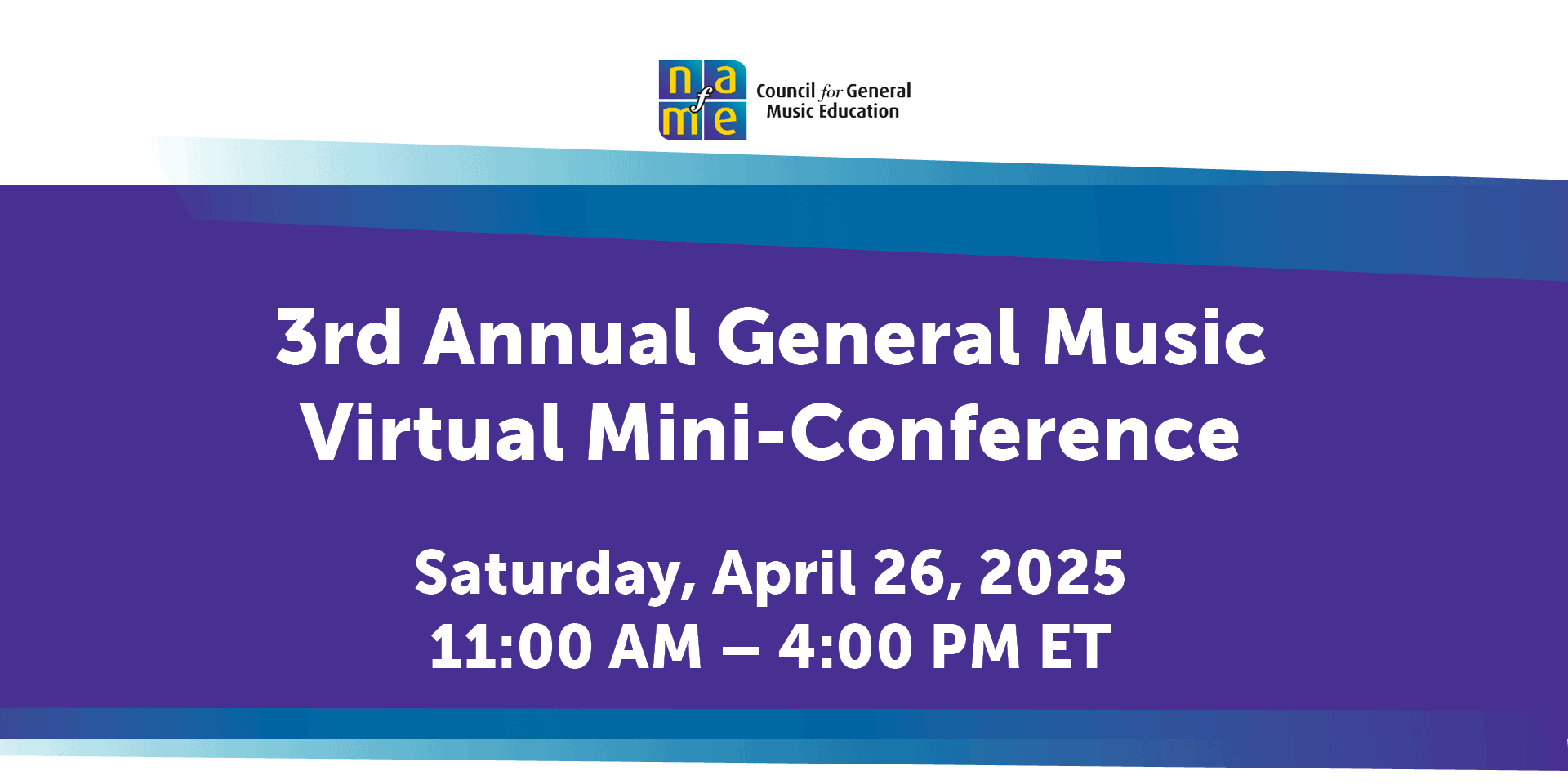
/ Professional Learning & Events / Event Calendar / 3rd Annual NAfME General Music Virtual Mini-Conference
About the Event
The 2025 NAfME General Music Virtual Conference will take place 11:00 AM to 4:00 PM ET, on April 26. This will be the third annual conference, with previous events happening in April 2023 and April 2024. (Conference agenda and presenter bios are below.)
This event is organized by NAfME’s Council for General Music Education in collaboration with organizations representing a variety of well-known general music education approaches. The event features live virtual sessions (sessions are also recorded for additional access after the event) on the Zoom Events platform. Participants will have opportunities to learn from and interact with clinicians/experienced music educators from multiple general music approaches and learn about key issues and trends of interest to general music educators. In addition to sessions of interest to all general music educators, some sessions will focus on 4th – 8th grade music lessons.
This event is free, but registration is required.
Event Sponsor:
MusicFirst is a company built by music educators for music educators, dedicated to helping music teachers and their students make the most of technology in the classroom.
Our team of educators curate content, software, hardware, and support—everything you need to integrate technology into your lessons. We believe that with the right tools and support, every student can achieve their full potential as a musician.
Conference Agenda
Session 1
11:00 a.m. Welcome
(Stephanie Benischek, Chair, NAfME Council for General Music Education)
11:10 – 11:40 a.m. Dalcroze Eurhythmics and Popular Music
Presenter: Marla Butke
This session will give participants an opportunity to observe and experience movement activities based on the Dalcroze Eurhythmics philosophy. Dalcroze Eurhythmics fosters rhythmic integrity and expression using the body as the primary instrument. Implementing kinesthetic means to create and deepen musical understanding also helps students bridge the aural and visual modes. The material presented is appropriate for both elementary and middle school students. Highlights of the session include music from Wicked and Lady Gaga. Creating a culture of movement will also be explored, and Dalcroze techniques will be demonstrated.
11:40 a.m. – 12:10 p.m. Masterful Musicianship for My Students?
Presenter: Georgia Newlin
Where does musicianship begin? Can musicianship be developed in students? In a literacy-based curriculum, by purposefully identifying, naming, and teaching specific techniques, musicianship can be fostered and developed, allowing young musicians to fulfill their potential as self-sufficient singers and players. Challenge your brain, your musicianship, and perhaps your philosophy of music education as we romp through various levels of musical engagement and come to understand how Zoltán Kodály’s vision of Music for Everyone has become a developmentally appropriate philosophy of music education that is more relevant than ever in empowering students to navigate the greater musical landscape and culture.
Session 2a
12:20 – 12:50 p.m. Creativity with Cultural Integrity Using the World Music Pedagogy Approach
Presenter: William Coppola
Do you want your students to be able to express themselves creatively while also developing their curiosity for musical cultures beyond their own? Drawing from the World Music Pedagogy (WMP) approach, this workshop will offer practical strategies for incorporating cultural diversity and creativity into the K–8 music classroom. We will also consider several practical questions, such as how to find and select musical examples from different cultures and how to do so with the utmost cultural integrity and respect.
12:50 – 1:20 p.m. Culturally Responsive Teaching: Using Circle Drumming to Reach Students from Diverse Backgrounds
Presenter: Amy Spears
Today, students from the elementary through university classroom come from a variety of backgrounds and cultures, and music classes are a great place to educate students about different cultures of the world. The recently updated World Music Drumming curriculum that Will Schmid initially published in the 1990s is a great place for any music teacher to start. In this session, I will share how I use the curriculum to teach students the music of West Africa in a culturally responsive way. I will familiarize participants with some of the content in the curriculum and share additional professional development opportunities. I will ultimately show how culturally responsive teaching is foundational to teaching the diverse students in our classroom and to the teaching and learning of music from various cultures around the world.
Session 2b
12:20 – 12:50 p.m. Music as a Second Language
Presenter: Mary Claxton
This workshop centers on the belief that learning is most impactful when young people are engaged in making music that reflects their musical and personal identities. This session will explore resources and methods for teaching popular music through modern band as well as music-as-a-second-language approaches.
12:50 – 1:20 p.m. Popular Music and the Orff-Keetman Approach
Presenter: Martina Vasil
This session explores the intersectionality between how popular musicians learn and how children learn music through the Orff-Keetman approach. I’ll show how Lucy Green’s 2006 research on popular musicians’ informal learning practices aligns closely with the core concepts of the Orff-Keetman approach. Participants will experience how lessons with popular music can go beyond what is being taught to how things are taught.
Session 3
1:30 – 2:00 p.m. Dichos, Rimas, y Proverbios, Oh My! Improvising Through Students’ Culture with Language
Presenter: Victor Lozada
Music educators, especially those serving older children, must work to provide opportunities for linguistically diverse students to express themselves using their full linguistic and musical repertories. One possibility is through the Orff Schulwerk approach because it starts with the language(s) of students. This session models how to leverage older (grades 4 – 8) students’ languages to foster improvisation through the use of dichos, rimas, y proverbios [sayings, rhymes, and proverbs], a strategy central to the Orff Schulwerk approach. We will explore this intercultural approach to general music as it intersects with Anzaldúa’s notion of the nepantla, the state of being in-between, or, in this case, a translanguaged, transmusical space. Examples include improvising through speech poems, body percussion, singing, and instruments.
2:00 – 2:30 p.m. Level Up Your Meter Game: A Dalcroze Lesson for Upper Elementary
Presenter: Lauren Hodgson
Let’s talk about how to level up your students’ musical understanding of meter with this engaging Dalcroze lesson focused on meter identification. Through a variety of interactive activities, students will develop their aural skills by learning to identify simple meters. They will connect body and mind by exploring how different meters feel in the body through embodying the characteristics of each meter individually and in collaboration with each other. With opportunities for improvisation, this fun and challenging lesson will not only enhance students’ musical literacy but also boost their confidence and creativity. Practical strategies and activities will be included to guide your students through this lesson.
Session 4
2:40 – 3:10 p.m. Forays into Functional Harmony: An MLT Approach to Harmony for Accompanying, Improvising, and Composing
Presenter: Herbert Marshall
Music Learning Theory uses a sequential approach to pattern instruction leading to readiness in functional harmony–first in major and harmonic minor, later in modes. This learning sequence leads to application of tonal patterns and chord functions in upper elementary and middle school settings, including pitched percussion, guitar, keyboard, and singing. We will explore several teaching sequences that take these foundational skills and use them in more sophisticated ways.
3:10 – 3:40 p.m. Musical Thinking Games and Techniques for the Feier-Drill
Presenter: John Crever
Explore engaging techniques and games from John Feierabend’s Conversational Solfege™ designed to enhance students’ aural and visual musicianship. This session highlights accessible teaching methods and practical, spontaneous musical challenge games that encourage confident musical decoding, reading, dictation, and improvisation. Educators will leave equipped with creative tools to naturally cultivate their students’ notational literacy, making the learning process a seemingly effortless assimilation for learners aged eight and older. Join this interactive session and empower your teaching with research-based methods that prioritize ear-first musical thinking.
Session 5
3:40 – 3:50 p.m. Write for the Journal of General Music Education
Presenter: Kendra Kay Friar
Join the JGME editor Kendra Kay Friar as she describes the inner workings of writing for this important NAfME journal.
3:50 – 4:00 Wrap up/Certificate Information
Speakers
 Marla Butke, Ph.D., retired Professor of Music, is a Master Teaching Artist for the American Eurhythmics Society (AES). She presents Dalcroze Eurhythmics workshops throughout the USA and internationally, including many national conferences. She is a co-founder of the American Eurhythmics Society and currently serves as the Vice President of both AES and the Greater Cincinnati Eurhythmics Society. She has written various articles published in music education journals and has co-authored two books with David Frego: Meaningful Movement: A Music Teacher’s Guide to Dalcroze Eurhythmics, published by Music is Elementary (2016), and Dalcroze Eurhythmics in the Choral Classroom published by Hal Leonard Corp. (2021).
Marla Butke, Ph.D., retired Professor of Music, is a Master Teaching Artist for the American Eurhythmics Society (AES). She presents Dalcroze Eurhythmics workshops throughout the USA and internationally, including many national conferences. She is a co-founder of the American Eurhythmics Society and currently serves as the Vice President of both AES and the Greater Cincinnati Eurhythmics Society. She has written various articles published in music education journals and has co-authored two books with David Frego: Meaningful Movement: A Music Teacher’s Guide to Dalcroze Eurhythmics, published by Music is Elementary (2016), and Dalcroze Eurhythmics in the Choral Classroom published by Hal Leonard Corp. (2021).
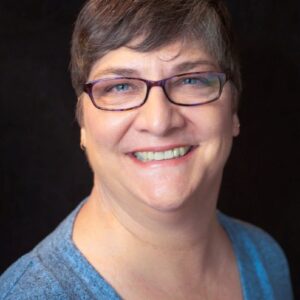 Georgia A Newlin, D.M.A., is an independent Music Education Consultant who has taught in early childhood/public school music positions for 16 years and at the collegiate level for 18. She is Past President of Organization of American Kodály Educators and is a member of the VoiceCare Network. She serves as a conductor for choral festivals and as a clinician for choral workshops, reading sessions, and intermediate grade methodology and is a consultant for curriculum planning. She teaches musicianship, conducting, and ensemble in Kodály programs at Indiana University, University of Hawai’i, and Southern Methodist University. She is a founder and musical director of Valley Treble Voices, an adult choral ensemble “making treble” in the Shenandoah Valley since 2022.
Georgia A Newlin, D.M.A., is an independent Music Education Consultant who has taught in early childhood/public school music positions for 16 years and at the collegiate level for 18. She is Past President of Organization of American Kodály Educators and is a member of the VoiceCare Network. She serves as a conductor for choral festivals and as a clinician for choral workshops, reading sessions, and intermediate grade methodology and is a consultant for curriculum planning. She teaches musicianship, conducting, and ensemble in Kodály programs at Indiana University, University of Hawai’i, and Southern Methodist University. She is a founder and musical director of Valley Treble Voices, an adult choral ensemble “making treble” in the Shenandoah Valley since 2022.
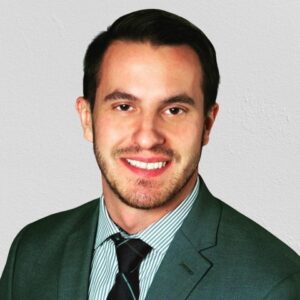 William J. Coppola is Assistant Professor of Music Teaching and Learning at the University of Southern California Thornton School of Music, where he teaches graduate courses in music education philosophy, research methodologies, and cultural diversity. He is the Global Music Representative for California Music Educators Association (CMEA) and chair-elect of the Philosophy Special Interest Research Group (SRIG) for NAfME. He is co-author of World Music Pedagogy, Volume IV: Instrumental Music Education (2018) and World Music Pedagogy, Volume VII: World Music in Higher Education (2020). His latest book, titled Egotism, Elitism, and the Ethics of Musical Humility, will be published by Oxford University Press in May 2025. He was previously an elementary music teacher for New York City Public Schools.
William J. Coppola is Assistant Professor of Music Teaching and Learning at the University of Southern California Thornton School of Music, where he teaches graduate courses in music education philosophy, research methodologies, and cultural diversity. He is the Global Music Representative for California Music Educators Association (CMEA) and chair-elect of the Philosophy Special Interest Research Group (SRIG) for NAfME. He is co-author of World Music Pedagogy, Volume IV: Instrumental Music Education (2018) and World Music Pedagogy, Volume VII: World Music in Higher Education (2020). His latest book, titled Egotism, Elitism, and the Ethics of Musical Humility, will be published by Oxford University Press in May 2025. He was previously an elementary music teacher for New York City Public Schools.
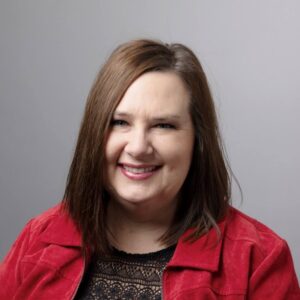 Amy Spears is Assistant Professor of Music Education at the State University of New York in Fredonia, where she teaches undergraduate and graduate courses in music education. Her research interests include popular music pedagogy, internationalizing music curricula, and diversifying music education to include marginalized individuals. She holds a Ph.D. in Music Education from Arizona State University, and her previous teaching experience includes secondary school instrumental and general music classes in Alabama and Arizona. A regular presenter at national and international conferences, she also has published chapters in many peer-reviewed research journals, in Marginalized Voices in Music Education (Routledge), and in Women’s Bands in America (Scarecrow Press). Her most recent article, Inside Eight Musical Futures Classrooms: What I Learned, was published in 2024 in Music Educators Journal.
Amy Spears is Assistant Professor of Music Education at the State University of New York in Fredonia, where she teaches undergraduate and graduate courses in music education. Her research interests include popular music pedagogy, internationalizing music curricula, and diversifying music education to include marginalized individuals. She holds a Ph.D. in Music Education from Arizona State University, and her previous teaching experience includes secondary school instrumental and general music classes in Alabama and Arizona. A regular presenter at national and international conferences, she also has published chapters in many peer-reviewed research journals, in Marginalized Voices in Music Education (Routledge), and in Women’s Bands in America (Scarecrow Press). Her most recent article, Inside Eight Musical Futures Classrooms: What I Learned, was published in 2024 in Music Educators Journal.
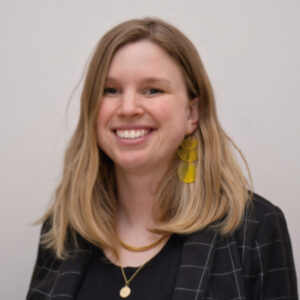 Mary Claxton has spent her professional life at the joyful intersection of music performance, teaching, and advocacy. She now serves as the Director of Teaching and Learning for Music Will, creating culturally responsive materials for students and teachers. Among her projects is the Music Will Academy platform, which provides access and sequenced learning to music teachers worldwide.
Mary Claxton has spent her professional life at the joyful intersection of music performance, teaching, and advocacy. She now serves as the Director of Teaching and Learning for Music Will, creating culturally responsive materials for students and teachers. Among her projects is the Music Will Academy platform, which provides access and sequenced learning to music teachers worldwide.
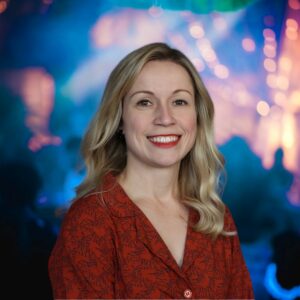 Martina Vasil, Ph.D., is an Associate Professor of Music Education at the University of Kentucky. She is an Orff-certified teacher with 20 years of teaching experience in Pennsylvania and Kentucky. She is a board member of Music Will and was appointed to the NAfME Music Teacher Profession Advisory Committee. She holds a B.M. and Ph.D. in Music Education from West Virginia University and an M.A. in Music Education from the Eastman School of Music. She was a Fulbright Specialist working with the only music school in Monrovia, Liberia, and she spearheaded the KMEA All-State Modern Band ensembles. Her research focuses on popular music education, Orff Schulwerk, and music teacher education. She has published in several leading journals and is the editor of Popular Music in Elementary Music Education (Oxford University Press, 2025).
Martina Vasil, Ph.D., is an Associate Professor of Music Education at the University of Kentucky. She is an Orff-certified teacher with 20 years of teaching experience in Pennsylvania and Kentucky. She is a board member of Music Will and was appointed to the NAfME Music Teacher Profession Advisory Committee. She holds a B.M. and Ph.D. in Music Education from West Virginia University and an M.A. in Music Education from the Eastman School of Music. She was a Fulbright Specialist working with the only music school in Monrovia, Liberia, and she spearheaded the KMEA All-State Modern Band ensembles. Her research focuses on popular music education, Orff Schulwerk, and music teacher education. She has published in several leading journals and is the editor of Popular Music in Elementary Music Education (Oxford University Press, 2025).
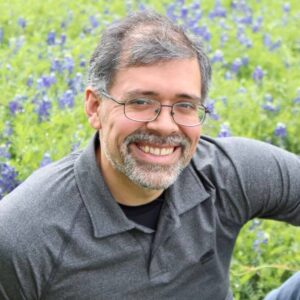 Victor Lozada, Ph.D., is an Assistant Professor of Bilingual Education at UNT Dallas and serves as Vice President-Elect of Diversity, Equity, Inclusion, and Access for the American Orff Schulwerk Association. He taught K – 5 general music for 14 years in Texas, where he held Orff Schulwerk, Kodály, and First Steps certifications. His research includes the intersections among music and bilingual education, and he frequently presents these topics at international and national venues. His research can be found in Journal of General Music Education, The Orff Echo, the Bilingual Research Journal, and the NABE Journal of Research and Practice, among others. He offers suggestions for including all students in music education in his book Diversity in Music Education: Honoring the Languages, Literacies, Abilities, and Cultures of All.
Victor Lozada, Ph.D., is an Assistant Professor of Bilingual Education at UNT Dallas and serves as Vice President-Elect of Diversity, Equity, Inclusion, and Access for the American Orff Schulwerk Association. He taught K – 5 general music for 14 years in Texas, where he held Orff Schulwerk, Kodály, and First Steps certifications. His research includes the intersections among music and bilingual education, and he frequently presents these topics at international and national venues. His research can be found in Journal of General Music Education, The Orff Echo, the Bilingual Research Journal, and the NABE Journal of Research and Practice, among others. He offers suggestions for including all students in music education in his book Diversity in Music Education: Honoring the Languages, Literacies, Abilities, and Cultures of All.
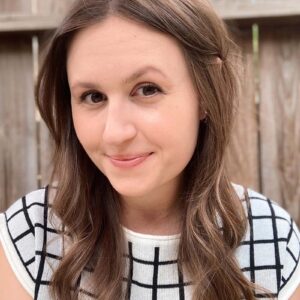 Lauren Hodgson is a pianist and educator who brings music to life through Dalcroze Eurhythmics. She has taught aural skills and eurhythmics at Baldwin Wallace University Conservatory of Music and Oberlin College, in addition to leading community Dalcroze classes for children in the Cleveland area. As a faculty member at the Dalcroze School of Music and Movement in Dallas, Texas, she trains educators pursuing certification. Currently, she is earning her Ph.D. in Music Education at Case Western Reserve University while serving as president of the Ohio Chapter of the Dalcroze Society of America.
Lauren Hodgson is a pianist and educator who brings music to life through Dalcroze Eurhythmics. She has taught aural skills and eurhythmics at Baldwin Wallace University Conservatory of Music and Oberlin College, in addition to leading community Dalcroze classes for children in the Cleveland area. As a faculty member at the Dalcroze School of Music and Movement in Dallas, Texas, she trains educators pursuing certification. Currently, she is earning her Ph.D. in Music Education at Case Western Reserve University while serving as president of the Ohio Chapter of the Dalcroze Society of America.
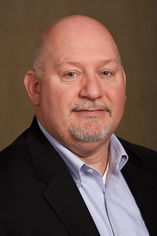 Herbert Marshall, Ph.D., is an Early Childhood and General Music Teacher Education Specialist and Associate Professor of Music Education at Kent State University. He holds degrees from Michigan State, Syracuse, and Temple universities and taught for 11 years in upstate New York. He serves on the editorial board of Research and Issues in Music Education and is the author of Strategies for Success in Musical Theatre. Other publications include those with Oxford University Press, GIA, and Rowman & Littlefield book chapters, as well as numerous journal articles. An active clinician, consultant, and conductor, he is the current President of and teaches workshops for the Gordon Institute for Music Learning.
Herbert Marshall, Ph.D., is an Early Childhood and General Music Teacher Education Specialist and Associate Professor of Music Education at Kent State University. He holds degrees from Michigan State, Syracuse, and Temple universities and taught for 11 years in upstate New York. He serves on the editorial board of Research and Issues in Music Education and is the author of Strategies for Success in Musical Theatre. Other publications include those with Oxford University Press, GIA, and Rowman & Littlefield book chapters, as well as numerous journal articles. An active clinician, consultant, and conductor, he is the current President of and teaches workshops for the Gordon Institute for Music Learning.
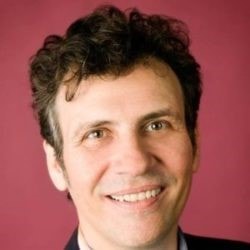 With more than 30 years of experience in the arts and education, John Crever creates and leads Feierabend Association for Music Education (FAME) professional development experiences for classroom music teachers. As a FAME Endorsed Teacher Trainer for First Steps in Music©️ and Conversational Solfege™ Levels 1 – 5, he seeks ways to bring the Feierabend training closer to teachers locally by providing school district in-house and summer professional training events in cities across the western United States. As a musician, he has experience styling popular, choral, Hip-Hop, musical theater, Latin, folk, and general music with piano and vocal.
With more than 30 years of experience in the arts and education, John Crever creates and leads Feierabend Association for Music Education (FAME) professional development experiences for classroom music teachers. As a FAME Endorsed Teacher Trainer for First Steps in Music©️ and Conversational Solfege™ Levels 1 – 5, he seeks ways to bring the Feierabend training closer to teachers locally by providing school district in-house and summer professional training events in cities across the western United States. As a musician, he has experience styling popular, choral, Hip-Hop, musical theater, Latin, folk, and general music with piano and vocal.
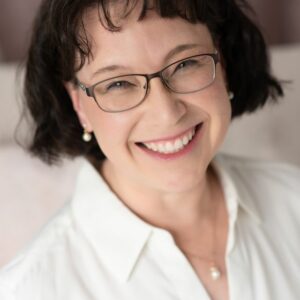 Kendra Kay Friar is an Associate Conductor of the Pacific Youth Choir of Portland, Oregon, where she directs two K–5 choirs and related educational programming. Previously, Kendra taught elementary general music for a 12 years at schools in the Portland, Oregon, and Austin, Texas, metro regions. She also worked as an adjunct professor at Pacific University in Forest Grove, Oregon. Kendra has presented multiple sessions for national, regional, and state conferences sponsored by NAfME, ACDA, and their affiliates. In 2021, she received the Excellence in Elementary Music Education Award from Oregon Music Educators Association (OMEA).
Kendra Kay Friar is an Associate Conductor of the Pacific Youth Choir of Portland, Oregon, where she directs two K–5 choirs and related educational programming. Previously, Kendra taught elementary general music for a 12 years at schools in the Portland, Oregon, and Austin, Texas, metro regions. She also worked as an adjunct professor at Pacific University in Forest Grove, Oregon. Kendra has presented multiple sessions for national, regional, and state conferences sponsored by NAfME, ACDA, and their affiliates. In 2021, she received the Excellence in Elementary Music Education Award from Oregon Music Educators Association (OMEA).
Start Date
April 26, 2025
End Date
April 26, 2025
Start and End Time
11:00 am - 4:00 pm (ET)
Event Category
- Conference
- Live Virtual
- Virtual
Specialities
- General Music
Teaching Levels
- Administrator/Supervisor
- PreK-12
